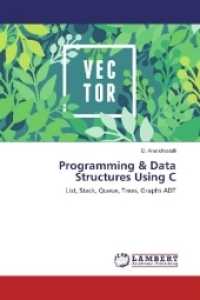- ホーム
- > 洋書
- > ドイツ書
- > Social Sciences, Jurisprudence & Economy
- > Politics, Society, Work
- > political science
Full Description
Volume one of Electoral Politics in Zimbabwe pays special attention to the overarching view that the 2023 harmonized elections define the fate of the major presidential contenders and their parties as well as (re) shaping the political and economic trajectories of the nation. Cognizant of the complex nature of the Zimbabwean political realm and nuanced dynamics at play, the chapters in this volume cover three interrelated themes: the electoral environment in Zimbabwean politics; language, politics, and elections in Zimbabwe; and lastly, electoral institutions and human rights in Zimbabwean politics. The chapters foreground the ongoing tensions and politicking between the two main rivals, the ruling party, ZANU PF and the main opposition party, the Citizens Coalition for Change (CCC). The contributors also highlight the impact of internal tensions and factionalism within the contending parties, the apparent voter apathy, disconcerting voices due to claims about lack of transparency and a toxic political space as factors impacting on the outcome of the 2023 presidential elections. The volume will appeal to academics and practitioners in politics, human rights, religion, gender, media, languages, linguistics, and development studies.
Contents
Chapter 1. Introduction: The Electoral terrain in Zimbabwean politics.- Section A: Electoral environment in Zimbabwean politics.- Chapter 2. Electoral bickering: Reforms, transparency and credibility of Zimbabwean elections.- Chapter 3. Cordoning off the debris of Electoral Violence and Generative Hegemony in Zimbabwean Politics: Spying on the 2023 Harmonised Elections.- Chapter 4. The semiotics of political schisms and prospects of nation-rebuilding: "Varakashi 4ED" and the "Terrorists".- Chapter 5. Voting: bliss or blisters? The Zimbabwean experience.- Chapter 6. Shifting the Voting Burden to Others: Abstainers and Turn Outers in Zimbabwean Elections..- Section B: Language, politics and elections in Zimbabwe.- Chapter 7. The interaction of language and politics: Polysemanticism in the aphorism 'we died for this country, so we will rule Zimbabwe forever.'.- Chapter 8. Stoking the Flames of Hate language and Conflict ahead of Zimbabwe's 2023 Polls.- Chapter 9. Hate Speech and the Electoral Processes in Zimbabwe.- Chapter 10. The "New Old Dispensation": A Sociolinguistic Analysis of Selected ZANU (PF) Leadership Speeches in Post-Mugabe Era and Implications on Zimbabwe`s Electoral Process.- Chapter 11.ChiShona language, a tool in winning political support during campaigning: A case of Buhera South in Zimbabwe.- Chapter 12. Political poetic/ theatrical campaigning pieces in indigenous languages in rural communities: The case of Bikita district in Masvingo, Zimbabwe.- Section C: Electoral institutions and human rights in Zimbabwean politics.- Chapter 13. Adjudication of presidential election disputes in Zimbabwe: The case of Chamisa v Mnangagwa.- Chapter 14. The judiciary and electoral disputes in Zimbabwe's contemporary political landscape.- Chapter 15. Political dialectics and the role of Zimbabwe Electoral Commission (ZEC) in elections: Friend or Foe?.-Chapter 16. Electoral laws, reforms, media transparency and the credibility of elections in Zimbabwe.








